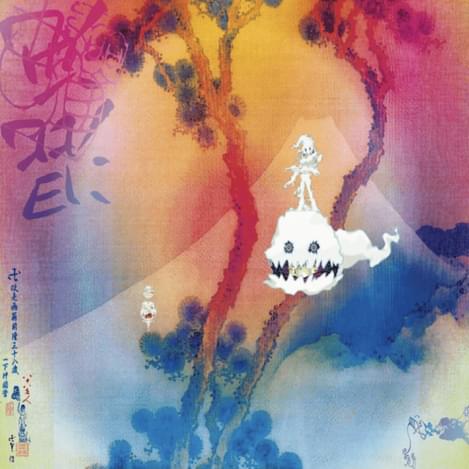Kanye West follows the divisive ye with Kids See Ghosts, a glorious collaboration with Kid Cudi
"Kids See Ghosts"

In the week that followed ye, I found myself asking questions that would daunt any Kanye superfan: has Kanye lost his genius? Is a bipolar disorder diagnosis the one hurdle he can’t overcome? Will Kids See Ghosts be the death knell of Kanye’s career, at least outside producing?
Thankfully, Kids See Ghosts is an album to send your demons packing and put your worst fears about Kanye West’s artistic decline to bed. I may be focusing on my teenage hero Kanye a little too much, as kudos of course must go to Kid Cudi also, who as one half of KSG delivers his best full-length offering since his classic debut, Man on the Moon: The End of Day. For the most part in fact, the album’s production is curated with Cudi in mind, a sonic bag of treats for those who vibe to the gloomy, celestial exploration of his early material as well as the rap rock stylings he has demonstrated since.
The sign of a great producer is one who knows how to get the best out of their collaborator. Just as he did on Pusha T’s luxurious and gritty DAYTONA, Kanye again delivers for Cudi, serving up a cathartic collection of eerie chopped-up samples that Cudi was (re)born to hum over. Were it not for the underwhelming ye dampening expectations, this would come as no surprise, as Kanye and Cudi have arguably been hip-hop’s most fruitful partnership of the past decade, beginning with Kanye’s stylistic 808s & Heartbreak that was so heavily-influenced by the hitherto-unknown Cudi and continuing right up to "Father Stretch My Hands, Pt. 1" off Kanye’s last album, The Life of Pablo. If I can feel aggrieved about anything Kids See Ghosts-related it’s that it took until 2018 to happen.
Granted, the KSG album we would have got in, say 2009, would be a whole lot different to the 2018 version. Kids See Ghosts is primarily centred around the mental health struggles of the two protagonists. Though publicly adored and celebrated as highly-influential artists, both men are no stranger to personal torment. Their travails have been well doumented, and are covered here, particularly on tracks like the hymnal "Reborn". This track is clearly ordained as the emotional centrepiece of KSG, a funeral for the ego and a rebirth of inner peace. It is a courageous song where the scars of Kanye and Cudi’s collective psyche are placed front-and-centre in a way that befits their iconic legacy of fostering vulnerability in hip-hop, challenging narrow conceptions of black masculinity at a time when rates of suicide are rising exponentially.
But what about the music? Can Kanye still flip a sample so good that it makes you scratch your head first and bop it later? He sure can. Whereas the beats on ye sounded rushed and underdeveloped, the beats on KSG have some meat on ’em, crafting a sonic mood board that evokes thoughts of psilocybin mushroom trips, spiritual healing and yes, ghosts. Kanye’s beats, which are a fitting canvas for the cathartic subject matter, again push the sonic parameters of hip-hop in a way he hasn’t done so consistently since Yeezus. It's a notable contrast with ye; Kanye’s newfound optimism on ye sounded like an exercise in self-delusion, yet with Cudi he seems genuinely reinvigorated, colouring dark soundscapes with the zany eccentricities of his voice as Cudi blends in seamlessly.
On "Cudi Montage", Kanye delivers one of his best verses in years, lamenting the counter-productive cycle of violence sparked by acts of vengeance (“Both sides lose somebody/Somebody die, somebody goes to jail”) and making a timely reference to the momentous release of Alice Johnson. It’s a glimpse of something resembling the ‘old Kanye’, one that uses the power of his voice for the good of his community.
“If you’re a Kanye West fan, you’re a fan of yourself”, Kanye once memorably declared, ostensibly arguing that the confident tone of his music is meant to empower the listener. Upon surveying the milestones of his legendary career, it’s true that were the music not made for our self-esteem it was at least for our approval. Kanye clearly craves the genius tag, to be seen as an auteur of taste rather than just another face in the hip-hop crowd, but Kids See Ghosts – and ye, although less successful in doing so - marks the first time where Kanye seems to be making music primarily for himself, a collage of therapeutic portraits designed to guide him hand-in-hand with Cudi on the pursuit of happiness. It’s easy to forget how close we came to losing them both. It’s easy to forget how long and arduous the road ahead remains. It’s easy to forget how much courage it takes, whoever you are, to admit your pain. So thank you, Kids See Ghosts. I’m waiting on the sequel already.
This is an abridged version of Eoin's original review. You can read it in full here.
Get the Best Fit take on the week in music direct to your inbox every Friday

Bon Iver
SABLE, fABLE

Mamalarky
Hex Key

Florist
Jellywish





